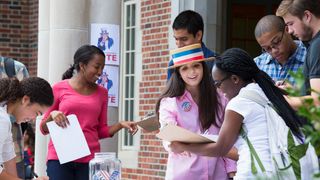Following the US midterm elections, 25-year-old Maxwell Alejandro Frost of Florida’s 10th congressional district will be the first of Generation Z to have a seat in the House of Representatives. Frost, born in 1997, represents the demographic now quickly becoming one of the Democrats’ most reliable constituencies.
Lauded by Democrats as the party’s heroes in these elections and even prompting a special thank you from President Joe Biden, about 60 per cent of those aged under 30 voted for Democrat candidates.
This is not a new phenomenon. Youth turnout was essential to Democrats’ reclamation of the House in the 2018 midterms with a whopping 72 per cent of those aged 18 to 29 voting for Democrats. Biden also pulled 54 per cent of votes from this demographic in the 2020 presidential election. In fact, Democrats have won support among younger voters by wide margins in every US federal election since 2004.
Younger Americans not only represent a promising future for the Democrats’ political successes, but for the country’s political processes more broadly. According to exit polls, the level of turnout among voters under 30 was the second highest in 30 years, and at about 30 per cent of the total eligible youth population, it well exceeds the historical 20 to 25 per cent proportional turnout for federal elections from young voters.
Despite the precedent of 2018, the enthusiasm of America’s youth surprised many. Pundits warned ahead of election day that America’s youth were politically disengaged and showing serious apathy about casting a vote.
Polling in September this year by Sydney University’s United States Studies Centre provided a similarly pessimistic expectation for youth turnout, finding those aged 18 to 34 to be the most likely of all age demographics to report that they were either “not sure” or planned not to vote in the congressional midterms.
I include myself, an under-30 Australian voter, among those who underestimated America’s youth. Earlier this year, in a piece for the US Studies Centre, I wrote about the “white-haired risk” to US democracy – that the dissonance between the top issues for older Americans in office and those for younger voters was exacerbating political disillusionment among America’s youth.
Despite the precedent of 2018, the enthusiasm of America’s youth surprised many. Pundits warned ahead of election day that America’s youth were politically disengaged and showing serious apathy about casting a vote.
So, what did we miss? Youthful optimism.
Ahead of the midterms, the US Studies Centre conducted public opinion polling of more than 1000 Americans. Time and again, examining trends for people aged 18 to 34 shows young Americans defying expectation with a rosy view of their country. Young Americans were the most likely of all age groups to say the best days of the US were in the future rather than in the past.
They far exceeded all other age groups in their belief that the US was the nation that carried the most influence in Asia today. They reported higher-than-average favourable views on a variety of aspects of American society, from political freedoms to gun control and race relations when compared with older age groups. They were also consistently the least concerned of the age demographics about a variety of issues confronting the nation’s systems, from the way democracy is working to the ability of Congress to do its job.
When it comes to maintaining younger voters’ enthusiasm for their country’s democratic processes, the US is by no means out of the woods. Two-thirds of eligible voters younger than 30 did not vote. High numbers of young voters still say they “don’t care” about politics and that their vote does not make a difference. First-time voter registration for those aged 18 and 19 was also not as high in these midterms as in 2018.
There are many reasons to be concerned about my generation, Gen Z: the use of social media for various cringeworthy purposes comes to mind almost immediately. And there’s lots of important history, such as the fall of the Twin Towers or the Berlin Wall, that our living memories cannot recall.
But our political consciousness is coming of age in an era when the future is increasingly uncertain. I feared my American peers would bury their heads in the sand, feeling powerless to make a difference. But I, like so many others, underestimated this generation.
America’s future is hopeful.




